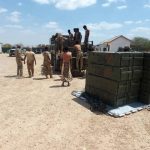The situation in Somalia has been marked by instability and violence for many years, with the terrorist group Al-Shabaab being a major contributor to the ongoing conflict. Over the past few months, however, the Somali government has been able to monitor cracks within the Al-Shabaab organization, leading to a loss of fighters and territories by the group. This has resulted in Al-Shabaab members pointing fingers at each other and has led to the detention of some of its senior members.
In a further escalation of tension, armed confrontations have broken out in Jilib town, with a senior member of Al-Shabaab known as Jabir being attacked by an opposing faction loyal to the self-declared leader of Al-Shabaab. This incident resulted in the death of five Al-Shabaab members and the injury of eight others, including the senior foreign Al-Shabaab fighter who was the target. He was captured and taken by Mahad Karate loyalists.
The underlying cause of this attack was a disagreement between Al-Shabaab members regarding foreign fighters who were at odds with the new Al-Shabaab commander of foreign fighters, Jaffar Sudaani. This disagreement highlights the deep fractures within the Al-Shabaab organization, including differences in ideology, leadership, and competing interests.
Government intelligence has learned that former Al-Shabaab commander of the foreign fighters wing, Salman Muhajir, is planning to storm an Al-Shabaab prison in Jilib that is holding most of his loyalists. These detainees were rounded up by Al-Shabaab commander Mohamed Amin under the direct command of the senior leader Mahad Karate. The prison is run and protected by Al-Shabaab commander Bashalow, who is also loyal to Mahad Karate.
The former Al-Shabaab commander of the foreign wing, Salman Muhaajir, is in hiding in Jilib as fighters loyal to Mahad Karate are hunting him down. The cracks within the terror group Al-Shabaab have turned into armed conflict, and this will hasten the downfall of the group. The government needs to take advantage of these differences and push harder against this merciless group that has tormented the Somali people for far too long.
The ongoing conflict within Al-Shabaab is indicative of the significant fractures that exist within the organization, as well as the deep-seated issues that contribute to the ongoing instability and violence in Somalia. While the weakening of Al-Shabaab is a positive development, it is important to remember that the group still poses a significant threat to the stability and security of Somalia and the region as a whole.
Therefore, it is imperative that the Somali government takes advantage of the weakened state of Al-Shabaab and increases its efforts to dismantle the group. This must be done through a comprehensive approach that includes not only military operations but also community outreach and support programs. Such an approach should aim to address the root causes of extremism, such as poverty, unemployment, and marginalization, and should focus on building a resilient and inclusive society.
The situation in Somalia remains complex and challenging, with the ongoing conflict within Al-Shabaab adding to the instability and violence in the country. While the weakening of Al-Shabaab is a positive development, the group still poses a significant threat to the security and stability of Somalia and the region. The Somali government must take advantage of the weakened state of Al-Shabaab and adopt a comprehensive approach to dismantle the group and address the underlying issues that contribute to instability and violence in the country.
By: Abdiqani




